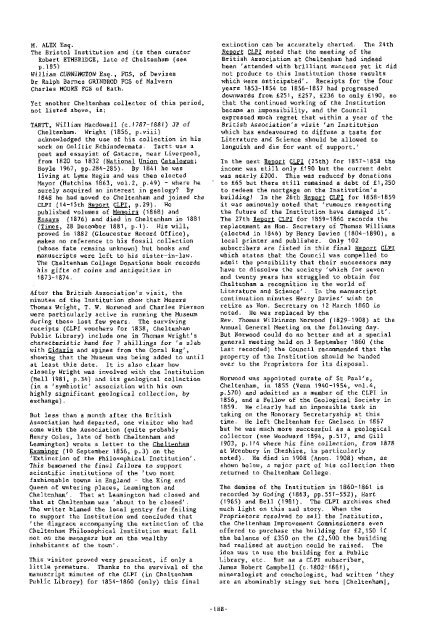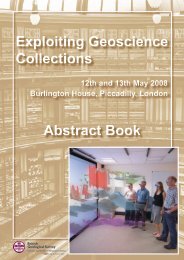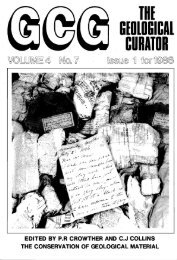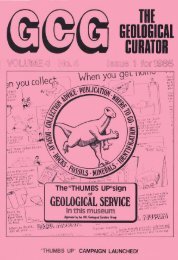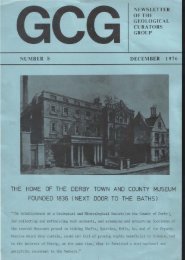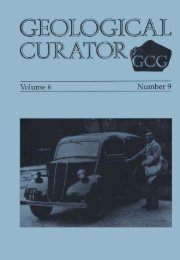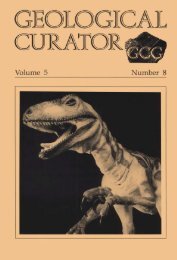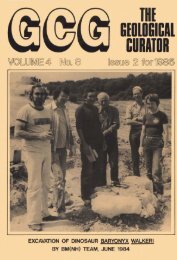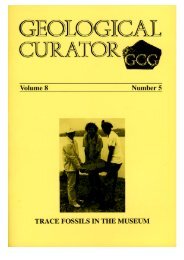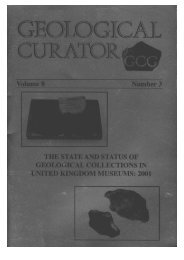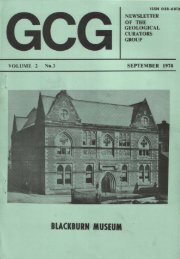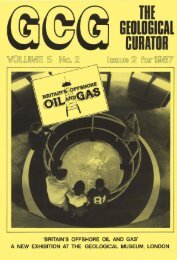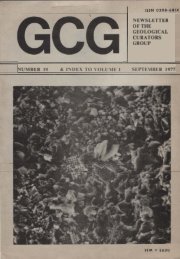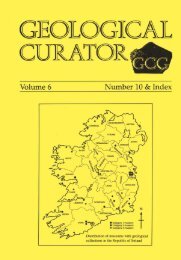Number 5 - Geological Curators Group
Number 5 - Geological Curators Group
Number 5 - Geological Curators Group
You also want an ePaper? Increase the reach of your titles
YUMPU automatically turns print PDFs into web optimized ePapers that Google loves.
M. ALEX Esq.The Bristol Institution and its then curatorRohert ETHERIDGE, late of Cheltenham (seep.185)William CUNNINGTON Esq., FGS, of DevizesDr Ralph Barnes GRINDROD FGS of MalvernCharles MOORE FGS of Bath.Yet another Cheltenham collector of this period,not listed above, is:TARTT, William Macdowall (c.1787-1881) JP ofCheltenham. Wright (1856, p.viii)acknowledged the use of his collection in hiswork on Oolitic Echinodermata. Tartt was apoet and essayist of Gatacre, near Liverpool,from 1820 to 1832 (National U& Cataloeue;Boyle 1967, pp.284-285). By 1841 he wasliving at Lyme Regis and was then electedMayor (Hutchins 1863, "01.2, p.49) - where hesurely acquired an interest in geology? By1848 he had moved to Cheltenham and joined theCLPI (14-15th Revort CLPI, p.29). Hepublished volumes of Memoirs (1868) and(1876) and died in Cheltenham in 1881('&m, 28 December 1881, p.1). His will,proved in 1882 (Gloucester Record Office),makes no reference to his fossil collection(whose fate remains unknown) hut books andmanuscripts were left to his sister-in-law.The Cheltenham College Donations book recordshis gifts of coins and antiquities in1873-1874.After the British Association's visit, theminutes of the Institution show that MessrsThomas Wright, T. W. Norwood and Charles Piersonwere particularly active in running the Museumduring these last few years. The survivingreceipts (CLPI vouchers for 1858, CheltenhamPublic Library) include one in Thomas Wright'scharacteristic hand for 7 shillings for 'a slabwith and spines from the Coral Rag',showing that the Museum was being added to untilat least this date. It is also clear howclosely Wright was involved with the Institution(Bell 1981, p.34) and its geological collection(in a 'symbiotic' association with his ownhighly significant geological collectian, byexchange).But less than a month after the BritishAssociation had departed, one visitor who hadcome with the Association (quite probablyHenry Cales, late of both Cheltenham andLeamington) wrote a letter to the CheltenhamExaminer (10 September 1856, p.3) on the'Extinction of the Philosophical Institution'.This bemoaned the final failure to supportscientific institutions of the 'two mostfashionable towns in England - the King andQueen of watering places, Leamington andCheltenham'. That at Leamington had closed andthat at Cheltenham was 'about to be closed'.The writer blamed the local gentry for failingto support the Institution and concluded that'the disgrace accompanying the extinction of theCheltenham Philosophical Institution must fallnot on the managers but on the wealthyinhabitants of the town'.This visitor proved very prescient, if anly alittle premature. Thanks to the survival of themanuscript minutes of the CLPI (in CheltenhamPublic Library) for 1854-1860 (only) this finalextinction can be accurately charted. The 24thRevort CLPl noted that the meeting of theBritish Association at Cheltenham had indeedbeen 'attended with brilliant success yet it didnot produce to this Institution those resultswhich were anticipated'. Receipts for the fouryears 1853-1854 to 1856-1857 had progresseddownwards from £251, £257, £236 to anly £190, sothat the continued working of the Institutionbecame an impossibility, and the Councilexpressed much regret that within a year of theBritish Association's visit 'an Institutionwhich has endeavoured to diffuse a taste forLiterature and Science should he allowed tolanguish and die for want of support.'In the next CLPI (25th) for 1857-1858 theincome was still only £190 but the current debtwas nearly £200. This was reduced by donationsto £65 but there still remained a debt of £1,250to redeem the mortgage on the Institution'sbuilding! In the 26th Report CL1 for 1858-1859it was ominously noted that 'rumours respectingthe future of the Institution have damaged it'.The 27th CLPI for 1859-1860 records thereplacement as Hon. Secretary of Thomas Williams(elected in 1846) by Henry Davies (1804-1890), alocal printer and publisher. Only 102subscribers are listed in this final Re~ort CLPIwhich states that the Council was compelled toadmit the possibility that their successors mayhave to dissolve the society 'which for sevenand twenty years has struggled to obtain forCheltenham a recognition in the world ofLiterature and Science'. In the manuscriptcontinuation minutes Henry Davies' wish toretire as Hon. Secretary on 12 March 1860 isnoted. He was replaced by theRev. Thomas Wilkinson Norwood (1829-1908) at theAnnual General Meeting on the following day.But Norwood could do no better and at a specialgeneral meeting held on 3 September 1860 (thelast recorded) the Council recommended that theproperty of the Institution should he handedover to the Proprietors for its disposal.Norwood was appointed curate of St Paul's,Cheltenham, in 1855 (Venn 1940-1954, vo1.4,p.570) and admitted as a member of the CLPI in1856, and a Fellow of the <strong>Geological</strong> Society in1859. He clearly had an impossible task intaking an the Honorary Secretaryship at thistime. He left Cheltenham for Chelsea in 1867but he was much mare successful as a geologicalcollector (see Woodward 1894, p.517, and Gill1903, p.114 where his fine collection, from 1878at Wrenbury in Cheshire, is particularlynoted). He died in 1908 (Anon. 1908) when, a8shown below, a major part of his collection thenreturned to Cheltenham College.The demise of the Institution in 1860-1861 isrecorded by Goding (1863, pp.551-552), Hart(1965) and Bell (1981). The CLPI archives shedmuch light on this sad story. When theProprietors resolved to sell the Institution,the Cheltenham Improvement Commissioners evenoffered to purchase the building for £2,150 ifthe balance of £350 on the f2,500 the buildinghad realised at auction could be raised. Theidea was to use the building for a PublicLibrary, etc. But as a CLPI subscriber,James Robert Campbell (c.1802-1861),mineralogist and concholagist, had written 'theyare an abominably stingy set here [Cheltenham],


